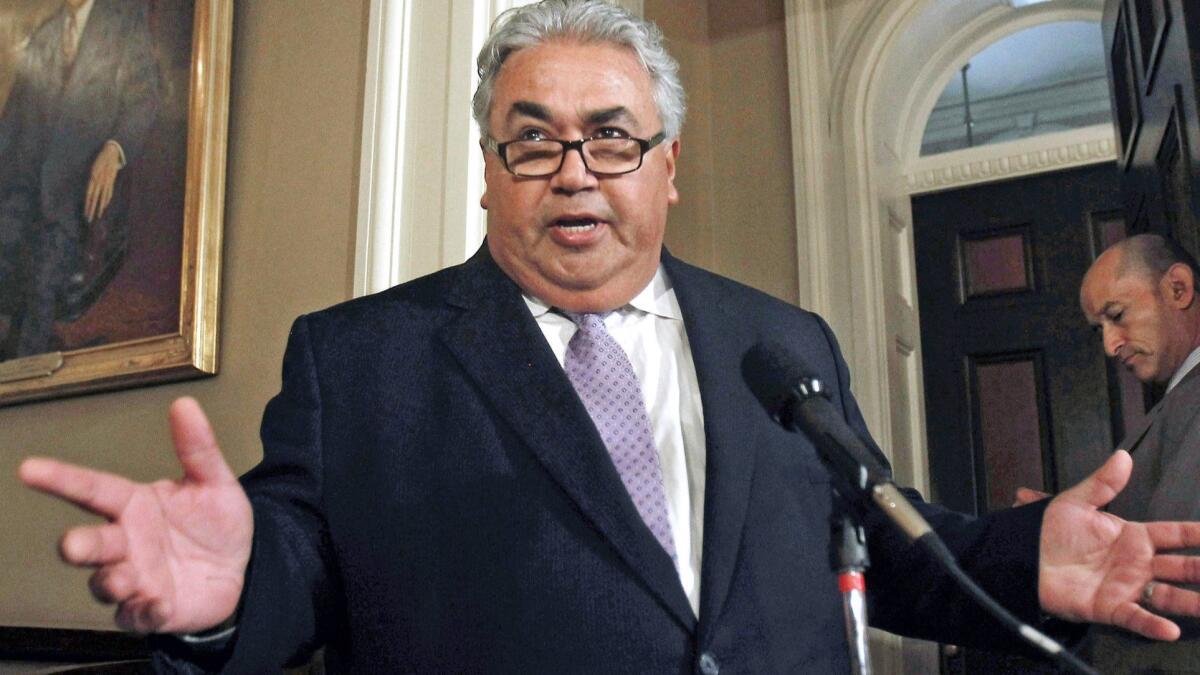Former state Sen. Ronald Calderon released after serving three years in political corruption case

- Share via
Reporting from Sacramento — Three years after he went to prison following a political corruption scandal, former state Sen. Ronald Calderon completed his sentence and was released from a halfway house Friday, ending a dark chapter in the history of the California Legislature that ended with four ex-lawmakers behind bars.
The Calderon case, related money laundering charges against his brother, former Assemblyman Tom Calderon, the unrelated corruption conviction of former state Sen. Leland Yee, and the conviction of former Sen. Roderick D. Wright for voter fraud and perjury sparked calls for reform. But it did not significantly change the culture in the California Legislature, some observers say.
“Besides being the butt of a few late-night comedy jokes, the reality is that the Calderon scandal served only to deepen people’s mistrust of politicians and led to a few reform bills that were quietly killed,” said Kathryn Phillips, a spokeswoman for California Common Cause.
Once the most powerful member of a political dynasty from the San Gabriel Valley, Ronald Calderon was sentenced to 3½ years in federal prison in 2016. The Democrat from Montebello admitted in a plea deal that he had accepted tens of thousands of dollars in bribes from undercover FBI agents and a hospital executive in return for official favors.
Calderon, 61, went to prison shortly after his brother, Tom Calderon, was sentenced to a shorter prison term as part of a plea deal in which he admitted laundering bribes taken by his brother Ronald.
“It’s been very hard on everybody,” Tom Calderon said Friday. “It’s not easy out there. You have to do whatever it takes to reinvent yourself and make a living for yourself.”
While Tom Calderon said he has retired since his release after serving four months of a prison sentence, his brother has posted on the Internet that he has obtained a job in business development for a security company. The two have not talked for months, Tom Calderon said.
Ronald Calderon could not be reached for comment, but his attorney, Mark Geragos, said Saturday that “he’s doing spectacular.”
A third brother, former Assemblyman Charles Calderon, was not implicated in the corruption scandal. Ian Calderon, who is Ronald’s nephew, is a state assemblyman elected in 2012 who also was not alleged to have any part in any illegal scheme.
Ronald Calderon was released from the Federal Correctional Institution in Sheridan, Ore., last July after serving 2½ years behind bars, and transferred to a halfway house in the Long Beach area to serve the rest of his sentence under supervision before being released Friday.
Federal prison officials did not immediately respond to questions about why Ronald Calderon was allowed to transfer to the halfway house and leave early. A judge in the case had recommended early release.
At his 2016 sentencing in Los Angeles, Ronald Calderon said he did not intend to break the law, but added: “My reputation is destroyed.”
Prosecutors had asked for a five-year sentence.
“Mr. Calderon betrayed the public trust,” then-U.S. Atty. Eileen Decker said at the time. “A basic premise of our society is that elected officials will not exchange their votes for monetary gain and that’s what Mr. Calderon did.”
Months earlier in 2016, Yee, a San Francisco Democrat, was sentenced to five years in prison for doing political favors in exchange for campaign cash in a separate federal corruption case. In 2014, the same year that Yee and Ronald Calderon were arrested, Wright, a Democrat from Inglewood, was sentenced to jail after he was convicted of eight felony counts, including perjury and voting fraud, for lying about living in his state Senate district.
Former Gov. Jerry Brown issued a pardon to Wright last month.
One result of the corruption scandals was the approval by California voters of Proposition 50, which gave the Senate and Assembly the power to suspend members without pay for misconduct. The 2016 initiative passed with 75.6% of the vote.
But other reform measures stalled, including one vetoed by Brown that would have banned gifts from lobbyists, reduced the value of gifts that could be accepted by lawmakers and prohibited them from accepting tickets to professional sporting events, concerts and amusement parks.
Phillips said the Legislature still needs to alter the way it does business.
“To change this system, we have to be willing to say no, not only to the most outrageous acts, but to the everyday, special access that moneyed interests have to elected officials,” she said.
Coverage of California politics »
Twitter: @mcgreevy99
More to Read
Get the L.A. Times Politics newsletter
Deeply reported insights into legislation, politics and policy from Sacramento, Washington and beyond. In your inbox twice per week.
You may occasionally receive promotional content from the Los Angeles Times.











